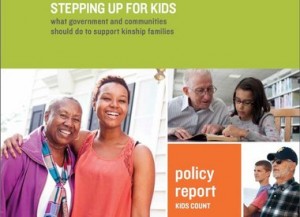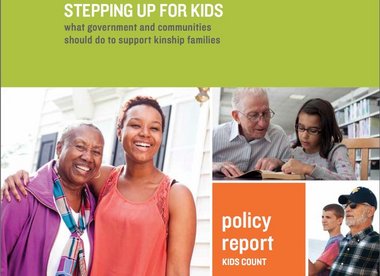 A new report finds that more American children are living under kinship care with relatives or family friends instead of their parents, than a decade ago.
A new report finds that more American children are living under kinship care with relatives or family friends instead of their parents, than a decade ago.
The report, published by Annie E. Casey Foundation’s KIDS COUNT project , entitled "Stepping Up for Kids: What Government and Communities Should Do to Support Kinship Families", found that approximately 2.7 million children are currently living with people other than their parents, an arrangement also known as kinship care. The report also found that about 9 percent of the nation’s youth will live under care of an extended family member for at least three months at some point in their childhood.
The authors of the report claim that kinship care needs to be addressed by both community and government programs, as many times family members or friends that assume parental responsibilities are hampered by limited income and the legal inability to obtain basic medical services or authorize medical consent for the children in their care.
According to the report, kinship care guardians are very likely to be poor, single, older, less educated and/or unemployed and are often unfamiliar with federal assistance programs, such as Temporary Assistance for Needy Families (TANF). Even with financial assistance, the authors of the report say kinship care guardians are likely to experience financial shortcomings, as the benefit levels for TANF recipients averages out at $249 a month for single-child households and $344 for households with two children.
According to recent U.S. Department of Agriculture estimates, the average monthly cost of raising a child in the United States is assumed to be $990, while two-child households are assumed to cost guardians, on average, an estimated $1,980 a month.
The report says that kinship care is especially prevalent in African-American communities, where children are approximately twice as likely to be raised by extended family or close family friends than the nation’s general population.
The authors of the report recommend several steps for communities and state agencies to help children in kinship care, including reform of foster-home licensing requirements and the use of TANF-funded programs to supplement low-income guardians.
“The federal government already has a solid framework in place for serving these families and several states have taken steps to actively support extended families and friends as they assume their new care giving roles,” Robert Green, Director of Family Services and Systems Policy at the Annie E. Casey Foundation, is quoted in a recent press release from the organization.
“Every state and community needs to adopt such changes, especially addressing the needs of lower-income families," he said.
